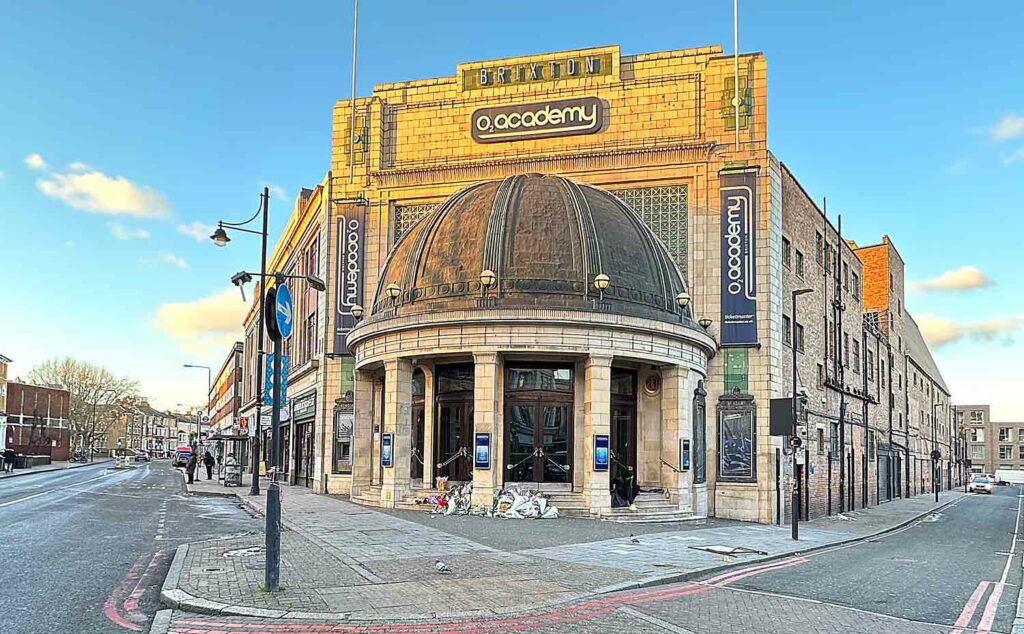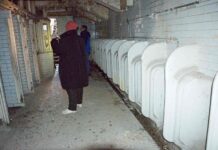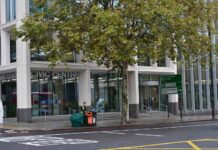
The Met police have revealed part of the reasoning behind their request for the licence of the O2 Academy in Brixton to be revoked, as it was revealed that the current temporary closure is costing the local economy more than half a million a week.
Rebecca Ikumelo and Gaby Hutchinson received fatal injuries on 15 December when about 1,000 people attempting to enter the venue stampeded through broken doors.
The Met says the AMG Group, operator of the Academy, is concentrating its proposals for change on what goes on outside the premises, while ignoring questions about the building and its doors which were raised with it after an earlier incident in February 2020. It also said AMG had resisted engaging with requests from the Met.
Brixton Business Improvement District (BID) said that a study it commissioned shows an estimated £537,000 per week decrease in visitor spending in Brixton since the Academy closed on 15 December up to 9 April – a total of £7.52m resulting from a decrease of 19,300 visitors a week.
‘Completely lost control’
In a witness statement published on the Lambeth council website yesterday (3 May) PC Jinelle Caldinez, the Met’s licensing officer for Lambeth based at Brixton police station, said it was apparent to officers arriving at the scene on 15 December “that staff and security had completely lost control of the situation”.
The Academy’s licence was suspended by Lambeth council’s licensing sub-committee until the operator could come up with variations to the licence that would prevent another tragedy.
On 30 January, the Academy Music Group (AMG) applied for a full variation of its licence and an event management plan was submitted on 20 February 2023.
The Met responded that this was premature because the causes of the incident had yet to be established. The council agreed, and AMG withdrew its application on 14 March.
On 22 March, it submitted a second application, again proposing new or amended licence conditions. Another event management plan was also submitted.
The Met statement says that steps required to promote licensing objectives in light of the serious incident at the premises “cannot sensibly be determined until the cause or causes of the serious incident are better understood”.
It went on: “The MPS has repeatedly asked AMG to assist in the identification of ‘what went wrong’ and how it is to be prevented from going wrong again.”
The statement said that in an email to AMG’s solicitors on 1 March the Met had said it would greatly assist them in evaluating the proposed amendments to the premises licence “to know which (if any) of the identified causes of the incident on 15 December are addressed, and by which proposed amendments”.
The Met statement says AMG “has resisted engaging with that request”.
It goes on to say that the Met are concerned that, at a hearing on 22 December, AMG denied that the structural integrity of the doors to the Brixton Academy had been raised as an issue in following an earlier incident in February 2020.
The statement continues by saying that documentation (contemporaneous notes of a meeting) produced at a full review on 16 January confirmed that the weakness of the doors was indeed raised after the February 2020 incident.
“Only when those notes were produced in evidence did AMG admit that the issue had previously been discussed with them,” the Met statement says.
It continues by saying that since the 16 January hearing, AMG has focused on preventing “crowding around the front doors of the premises”.
The Met’s view is that this is “far too narrow” an analysis of what went wrong.
“AGM appear to regard ‘the incident’ simply as the gathering of the crowd outside the entrance to the Academy and the ‘uncontrolled manner’ of their entry,” the Met statement says.
“What happened inside, however, is as much a part of the incident as what happened outside, if not more so: the fatalities occurred in the foyer.
“The MPS has lost confidence in the premises licence holder.”
It said that, “regrettably”, the solution suggested “has not been successful in identifying the remedial measures which need to be in place before the Academy can safely re-open”.
In conclusion, the Met submits that “it is appropriate for the licensing authority again to review the premises licence in light of all current and changed circumstances.
“The MPS invites the sub-committee to consider revoking AMG’s licence.”
No date has yet been set for a hearing. The next meeting of Lambeth council’s licensing sub-committee is scheduled for Monday 15 May and no agenda has had been published at the time of writing.
There are two outstanding applications in relation to the venue, AMG’s licence variations plan and the Met’s licence review application. A council spokesperson said both will be considered “in due course”.
‘Significant impact’
Brixton Business Improvement District (BID) said in a statement that the tragic incidents of 15 December “have been received by our community with concern and alarm”.
The BID said “repercussions and impact from any sudden and tragic death are lasting and often devastating. In Brixton, these recent incidents will never be forgotten.”
The O2 Academy in Brixton had operated as a live music entertainment centre for more than 50 years, the BID said, adding that it plays a significant role as a venue for all genres of live music, and is a key visitor destination in Brixton.
A crucial contributor to the local hospitality and night-time industry, “its temporary closure is impacting significantly on the available live music venues across London and even more significantly on hospitality and the night-time industry in Brixton,” the BID said.
The venue had been proactive in working with the BID, taking part in its night-time economy meetings and working to minimise crime and disorder in the local community.
“It is also proactive in minimising public nuisance … through the cleaning of the paths that surround the venue and the rapid evacuation of visitors quietly from the close vicinity,” the BID said.
A study it commissioned to better understand the impact of the temporary closure of the venue shows an estimated £537,000 per week decrease in visitor spending since the Academy closed on 15 December to 9 April – a total £7.52m resulting from a decrease of 19,300 visitors per week.
Some specific night-time hospitality businesses in Brixton, as well as with daytime organisations, might be significantly affected by the continued closure of the Academy, the BID warned.
“We continue to lobby on behalf of Brixton 02 Academy and stand with our business community to see the safe reopening of the venue,” it said.
About 40% of the money spent in Brixton takes place in transactions after 6pm and the Academy has a central role in this night time economy.
The Academy had staged more than 650 shows, attracting a total audience of nearly 2.4m since 2017.






